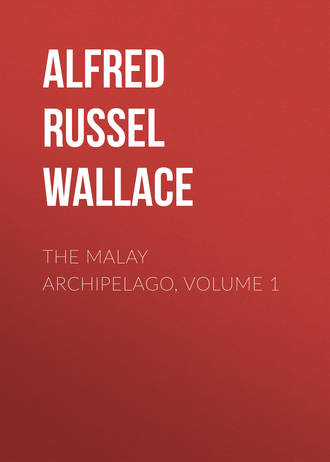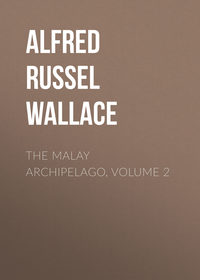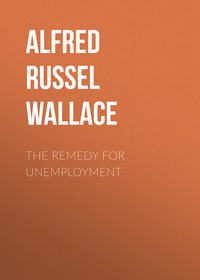 полная версия
полная версияThe Malay Archipelago, Volume 1
Two days afterwards, I called on the Rajah to ask him to send a guide with me to show me the house I was to occupy. He immediately ordered a man to be sent for, gave him instructions, and in a few minutes we were on our way. My conductor could speak no Malay, so we walked on in silence for an hour, when we turned into a pretty good house and I was asked to sit down. The head man of the district lived here, and in about half an hour we started again, and another hour's walk brought us to the village and where I was to be lodged. We went to the residence of the village chief, who conversed with my conductor for some time.
Getting tired, I asked to be shown the house that was prepared for me, but the only reply I could get was, "Wait a little," and the parties went on talking as before. So I told them I could not wait, as I wanted to see the house and then to go shooting in the forest. This seemed to puzzle them, and at length, in answer to questions, very poorly explained by one or two bystanders who knew a little Malay, it came out that no house was ready, and no one seemed to have the least idea where to get one. As I did not want to trouble the Rajah any more, I thought it best to try to frighten them a little; so I told them that if they did not immediately find me a house as the Rajah had ordered, I should go back and complain to him, but that if a house was found me I would pay for the use of it. This had the desired effect, and one of the head men of the village asked me to go with him and look for a house. He showed me one or two of the most miserable and ruinous description, which I at once rejected, saying, "I must have a good one, and near to the forest." The next he showed me suited very well, so I told him to see that it was emptied the next day, for that the day after I should come and occupy it.
On the day mentioned, as I was not quite ready to go, I sent my two Macassar boys with brooms to sweep out the house thoroughly. They returned in the evening and told me that when they got there the house was inhabited, and not a single article removed. However, on hearing they had come to clean and take possession, the occupants made a move, but with a good deal of grumbling, which made me feel rather uneasy as to how the people generally might take my intrusion into their village. The next morning we took our baggage on three packhorses, and, after a few break-downs, arrived about noon at our destination.
After getting all my things set straight, and having made a hasty meal, I determined if possible to make friends with the people. I therefore sent for the owner of the house and as many of his acquaintances as liked to come, to have a "bitchara," or talk. When they were all seated, I gave them a little tobacco all around, and having my boy Baderoon for interpreter, tried to explain to them why I came there; that I was very sorry to turn them out of the house, but that the Rajah had ordered it rather than build a new one, which was what I had asked for, and then placed five silver rupees in the owner's hand as one month's rent. I then assured them that my being there would be a benefit to them, as I should buy their eggs and fowls and fruit; and if their children would bring me shells and insects, of which I showed them specimens, they also might earn a good many coppers. After all this had been fully explained to them, with a long talk and discussion between every sentence, I could see that I had made a favourable impression; and that very afternoon, as if to test my promise to buy even miserable little snail-shells, a dozen children came one after another, bringing me a few specimens each of a small Helix, for which they duly received "coppers," and went away amazed but rejoicing.
A few days' exploration made me well acquainted with the surrounding country. I was a long way from the road in the forest which I had first visited, and for some distance around my house were old clearings and cottages. I found a few good butterflies, but beetles were very scarce, and even rotten timber and newly-felled trees (generally so productive) here produced scarcely anything. This convinced me that there was not a sufficient extent of forest in the neighbourhood to make the place worth staying at long, but it was too late now to think of going further, as in about a month the wet season would begin; so I resolved to stay here and get what was to be had. Unfortunately, after a few days I became ill with a low fever which produced excessive lassitude and disinclination to all exertion. In vain I endeavoured to shake it off; all I could do was to stroll quietly each day for an hour about the gardens near, and to the well, where some good insects were occasionally to be found; and the rest of the day to wait quietly at home, and receive what beetles and shells my little corps of collectors brought me daily. I imputed my illness chiefly to the water, which was procured from shallow wells, around which there was almost always a stagnant puddle in which the buffaloes wallowed. Close to my house was an enclosed mudhole where three buffaloes were shut up every night, and the effluvia from which freely entered through the open bamboo floor. My Malay boy Ali was affected with the same illness, and as he was my chief bird-skinner I got on but slowly with my collections.
The occupations and mode of life of the villagers differed but little from those of all other Malay races. The time of the women was almost wholly occupied in pounding and cleaning rice for daily use, in bringing home firewood and water, and in cleaning, dyeing, spinning, and weaving the native cotton into sarongs. The weaving is done in the simplest kind of frame stretched on the floor; and is a very slow and tedious process. To form the checked pattern in common use, each patch of coloured threads has to be pulled up separately by hand and the shuttle passed between them; so that about an inch a day is the usual progress in stuff a yard and a half wide. The men cultivate a little sirih (the pungent pepper leaf used for chewing with betel-nut) and a few vegetables; and once a year rudely plough a small patch of ground with their buffaloes and plant rice, which then requires little attention until harvest time. Now and then they have to see to the repairs of their houses, and make mats, baskets, or other domestic utensils, but a large part of their time is passed in idleness.
Not a single person in the village could speak more than a few words of Malay, and hardly any of the people appeared to have seen a European before. One most disagreeable result of this was that I excited terror alike in man and beast. Wherever I went, dogs barked, children screamed, women ran away, and men stared as though I were some strange and terrible cannibal or monster. Even the pack-horses on the roads and paths would start aside when I appeared and rush into the jungle; and as to those horrid, ugly brutes, the buffaloes, they could never be approached by me; not for fear of my own but of others' safety. They would first stick out their necks and stare at me, and then on a nearer view break loose from their halters or tethers, and rush away helter-skelter as if a demon were after them, without any regard for what might be in their way. Whenever I met buffaloes carrying packs along a pathway, or being driven home to the village, I had to turn aside into the jungle and hide myself until they had passed, to avoid a catastrophe which would increase the dislike with which I was already regarded. Everyday about noon the buffaloes were brought into the villa, and were tethered in the shade around the houses; and then I had to creep about like a thief by back ways, for no one could tell what mischief they might do to children and houses were I to walk among them. If I came suddenly upon a well where women were drawing water or children bathing, a sudden flight was the certain result; which things occurring day after day, were very unpleasant to a person who does not like to be disliked, and who had never been accustomed to be treated as an ogre.
About the middle of November, finding my health no better, and insects, birds, and shells all very scarce, I determined to return to Mamajam, and pack up my collections before the heavy rains commenced. The wind had already begun to blow from the west, and many signs indicated that the rainy season might set in earlier than usual; and then everything becomes very damp, and it is almost impossible to dry collections properly. My kind friend Mr. Mesman again lent me his pack-horses, and with the assistance of a few men to carry my birds and insects, which I did not like to trust on horses' backs, we got everything home safe. Few can imagine the luxury it was to stretch myself on a sofa, and to take my supper comfortably at table seated in my easy bamboo chair, after having for five weeks taken all my meals uncomfortably on the floor. Such things are trifles in health, but when the body is weakened by disease the habits of a lifetime cannot be so easily set aside.
My house, like all bamboo structures in this country, was a leaning one, the strong westerly winds of the wet season having set all its posts out of the perpendicular to such a degree as to make me think it might someday possibly go over altogether. It is a remarkable thing that the natives of Celebes have not discovered the use of diagonal struts in strengthening buildings. I doubt if there is a native house in the country two years old and at all exposed to the wind, which stands upright; and no wonder, as they merely consist of posts and joists all placed upright or horizontal, and fastened rudely together with rattans. They may be seen in every stage of the process of tumbling down, from the first slight inclination, to such a dangerous slope that it becomes a notice to quit to the occupiers.
The mechanical geniuses of the country have only discovered two ways of remedying the evil. One is, after it has commenced, to tie the house to a post in the ground on the windward side by a rattan or bamboo cable. The other is a preventive, but how they ever found it out and did not discover the true way is a mystery. This plan is, to build the house in the usual way, but instead of having all the principal supports of straight posts, to have two or three of them chosen as crooked as possible. I had often noticed these crooked posts in houses, but imputed it to the scarcity of good, straight timber, until one day I met some men carrying home a post shaped something like a dog's hind leg, and inquired of my native boy what they were going to do with such a piece of wood. "To make a post for a house," said he. "But why don't they get a straight one, there are plenty here?" said I. "Oh," replied he, "they prefer some like that in a house, because then it won't fall," evidently imputing the effect to some occult property of crooked timber. A little consideration and a diagram will, however, show, that the effect imputed to the crooked post may be really produced by it. A true square changes its figure readily into a rhomboid or oblique figure, but when one or two of the uprights are bent or sloping, and placed so as to oppose each other, the effect of a strut is produced, though in a rude and clumsy manner.
Just before I had left Mamajam the people had sown a considerable quantity of maize, which appears above ground in two or three days, and in favourable seasons ripens in less than two months. Owing to a week's premature rains the ground was all flooded when I returned, and the plants just coming into ear were yellow and dead. Not a grain would be obtained by the whole village, but luckily it is only a luxury, not a necessity of life. The rain was the signal for ploughing to begin, in order to sow rice on all the flat lands between us and the town. The plough used is a rude wooden instrument with a very short single handle, a tolerably well-shaped coulter, and the point formed of a piece of hard palm-wood fastened in with wedges. One or two buffaloes draw it at a very slow pace. The seed is sown broadcast, and a rude wooden harrow is used to smooth the surface.
By the beginning of December the regular wet season had set in. Westerly winds and driving rains sometimes continued for days together; the fields for miles around were under water, and the ducks and buffaloes enjoyed themselves amazingly. All along the road to Macassar, ploughing was daily going on in the mud and water, through which the wooden plough easily makes its way, the ploughman holding the plough-handle with one hand while a long bamboo in the other serves to guide the buffaloes. These animals require an immense deal of driving to get them on at all; a continual shower of exclamations is kept up at them, and "Oh! ah! Gee! ugh!" are to be heard in various keys and in an uninterrupted succession all day long. At night we were favoured with a different kind of concert. The dry ground around my house had become a marsh tenanted by frogs, who kept up a most incredible noise from dusk to dawn. They were somewhat musical too, having a deep vibrating note which at times closely resembles the tuning of two or three bass-viols in an orchestra. In Malacca and Borneo I had heard no such sounds as these, which indicates that the frogs, like most of the animals of Celebes, are of species peculiar to it.
My kind friend and landlord, Mr. Mesman, was a good specimen of the Macassar-born Dutchman. He was about thirty-five years of age, had a large family, and lived in a spacious house near the town, situated in the midst of a grove of fruit trees, and surrounded by a perfect labyrinth of offices, stables, and native cottages occupied by his numerous servants, slaves, or dependants. He usually rose before the sun, and after a cup of coffee looked after his servants, horses, and dogs, until seven, when a substantial breakfast of rice and meat was ready in a cool verandah. Putting on a clean white linen suit, he then drove to town in his buggy, where he had an office, with two or three Chinese clerks who looked after his affairs. His business was that of a coffee and opium merchant. He had a coffee estate at Bontyne, and a small prau which traded to the Eastern islands near New Guinea, for mother-of-pearl and tortoiseshell. About one he would return home, have coffee and cake or fried plantain, first changing his dress for a coloured cotton shirt and trousers and bare feet, and then take a siesta with a book. About four, after a cup of tea, he would walk round his premises, and generally stroll down to Mamajam to pay me a visit, and look after his farm.
This consisted of a coffee plantation and an orchard of fruit trees, a dozen horses and a score of cattle, with a small village of Timorese slaves and Macassar servants. One family looked after the cattle and supplied the house with milk, bringing me also a large glassful every morning, one of my greatest luxuries. Others had charge of the horses, which were brought in every afternoon and fed with cut grass. Others had to cut grass for their master's horses at Macassar—not a very easy task in the dry season, when all the country looks like baked mud; or in the rainy season, when miles in every direction are flooded. How they managed it was a mystery to me, but they know grass must be had, and they get it. One lame woman had charge of a flock of ducks. Twice a day she took them out to feed in the marshy places, let them waddle and gobble for an hour or two, and then drove them back and shut them up in a small dark shed to digest their meal, whence they gave forth occasionally a melancholy quack. Every night a watch was set, principally for the sake of the horses—the people of Goa, only two miles off, being notorious thieves, and horses offering the easiest and most valuable spoil. This enabled me to sleep in security, although many people in Macassar thought I was running a great risk, living alone in such a solitary place and with such bad neighbours.
My house was surrounded by a kind of straggling hedge of roses, jessamines, and other flowers, and every morning one of the women gathered a basketful of the blossoms for Mr. Mesman's family. I generally took a couple for my own breakfast table, and the supply never failed during my stay, and I suppose never does. Almost every Sunday Mr. M. made a shooting excursion with his eldest son, a lad of fifteen, and I generally accompanied him; for though the Dutch are Protestants, they do not observe Sunday in the rigid manner practised in England and English colonies. The Governor of the place has his public reception every Sunday evening, when card-playing is the regular amusement.
On December 13th I went on board a prau bound for the Aru Islands, a journey which will be described in the latter part of this work.
On my return, after a seven months' absence, I visited another district to the north of Macassar, which will form the subject of the next CHAPTER.
CHAPTER XVI. CELEBES
(MACASSAR, JULY TO NOVEMBER, 1857.)I REACHED Macassar again on the 11th of July, and established myself in my old quarters at Mamajam, to sort, arrange, clean, and pack up my Aru collections. This occupied me a month; and having shipped them off for Singapore, had my guns repaired, and received a new one from England, together with a stock of pins, arsenic, and other collecting requisites. I began to feel eager for work again, and had to consider where I should spend my time until the end of the year; I had left Macassar seven months before, a flooded marsh being ploughed up for the rice-sowing. The rains had continued for five months, yet now all the rice was cut, and dry and dusty stubble covered the country just as when I had first arrived there.
After much inquiry I determined to visit the district of Maros, about thirty miles north of Macassar, where Mr. Jacob Mesman, a brother of my friend, resided, who had kindly offered to find me house-room and give me assistance should I feel inclined to visit him. I accordingly obtained a pass from the Resident, and having hired a boat set off one evening for Maros. My boy Ali was so ill with fever that I was obliged to leave him in the hospital, under the care of my friend the German doctor, and I had to make shift with two new servants utterly ignorant of everything. We coasted along during the night, and at daybreak entered the Maros river, and by three in the afternoon reached the village. I immediately visited the Assistant Resident, and applied for ten men to carry my baggage, and a horse for myself. These were promised to be ready that night, so that I could start as soon as I liked in the morning. After having taken a cup of tea I took my leave, and slept in the boat. Some of the men came at night as promised, but others did not arrive until the next morning. It took some time to divide my baggage fairly among them, as they all wanted to shirk the heavy boxes, and would seize hold of some light article and march off with it, until made to come back and wait until the whole had been fairly apportioned. At length about eight o'clock all was arranged, and we started for our walk to Mr. M.'s farm.
The country was at first a uniform plain of burned-up rice-grounds, but at a few miles' distance precipitous hills appeared, backed by the lofty central range of the peninsula. Towards these our path lay, and after having gone six or eight miles the hills began to advance into the plain right and left of us, and the ground became pierced here and there with blocks and pillars of limestone rock, while a few abrupt conical hills and peaks rose like islands. Passing over an elevated tract forming the shoulder of one of the hills, a picturesque scene lay before us. We looked down into a little valley almost entirely surrounded by mountains, rising abruptly in huge precipices, and forming a succession of knolls and peaks and domes of the most varied and fantastic shapes. In the very centre of the valley was a large bamboo house, while scattered around were a dozen cottages of the same material.
I was kindly received by Mr. Jacob Mesman in an airy saloon detached from the house, and entirely built of bamboo and thatched with grass. After breakfast he took me to his foreman's house, about a hundred yards off, half of which was given up to me until I should decide where to have a cottage built for my own use. I soon found that this spot was too much exposed to the wind and dust, which rendered it very difficult to work with papers or insects. It was also dreadfully hot in the afternoon, and after a few days I got a sharp attack of fever, which determined me to move. I accordingly fixed on a place about a mile off, at the foot of a forest-covered hill, where in a few days Mr. M. built for me a nice little house, consisting of a good-sized enclosed verandah or open room, and a small inner sleeping-room, with a little cookhouse outside. As soon as it was finished I moved into it, and found the change most agreeable.
The forest which surrounded me was open and free from underwood, consisting of large trees, widely scattered with a great quantity of palm-trees (Arenga saccharifera), from which palm wine and sugar are made. There were also great numbers of a wild Jack-fruit tree (Artocarpus), which bore abundance of large reticulated fruit, serving as an excellent vegetable. The ground was as thickly covered with dry leaves as it is in an English wood in November; the little rocky streams were all dry, and scarcely a drop of water or even a damp place was anywhere to be seen. About fifty yards below my house, at the foot of the hill, was a deep hole in a watercourse where good water was to be had, and where I went daily to bathe by having buckets of water taken out and pouring it over my body.
My host Mr. M. enjoyed a thoroughly country life, depending almost entirely on his gun and dogs to supply his table. Wild pigs of large size were very plentiful and he generally got one or two a week, besides deer occasionally, and abundance of jungle-fowl, hornbills, and great fruit pigeons. His buffaloes supplied plenty of milk from which he made his own butter; he grew his own rice and coffee, and had ducks, fowls, and their eggs, in profusion. His palm-trees supplied him all the year round with "sagueir," which takes the place of beer; and the sugar made from them is an excellent sweetmeat. All the fine tropical vegetables and fruits were abundant in their season, and his cigars were made from tobacco of his own raising. He kindly sent me a bamboo of buffalo-milk every morning; it was as thick as cream, and required diluting with water to keep it fluid during the day. It mixes very well with tea and coffee, although it has a slight peculiar flavour, which after a time is not disagreeable. I also got as much sweet "sagueir" as I liked to drink, and Mr. M. always sent me a piece of each pig he killed, which with fowls, eggs, and the birds we shot ourselves, and buffalo beef about once a fortnight, kept my larder sufficiently well supplied.
Every bit of flatland was cleared and used as rice-fields, and on the lower slopes of many of the hills tobacco and vegetables were grown. Most of the slopes are covered with huge blocks of rock, very fatiguing to scramble over, while a number of the hills are so precipitous as to be quite inaccessible. These circumstances, combined with the excessive drought, were very unfavourable for my pursuits. Birds were scarce, and I got but few new to me. Insects were tolerably plentiful, but unequal. Beetles, usually so numerous and interesting, were exceedingly scarce, some of the families being quite absent and others only represented by very minute species. The Flies and Bees, on the other hand, were abundant, and of these I daily obtained new and interesting species. The rare and beautiful Butterflies of Celebes were the chief object of my search, and I found many species altogether new to me, but they were generally so active and shy as to render their capture a matter of great difficulty. Almost the only good place for them was in the dry beds of the streams in the forest, where, at damp places, muddy pools, or even on the dry rocks, all sorts of insects could be found. In these rocky forests dwell some of the finest butterflies in the world. Three species of Ornithoptera, measuring seven or eight inches across the wings, and beautifully marked with spots or masses of satiny yellow on a black ground, wheel through the thickets with a strong sailing flight. About the damp places are swarms of the beautiful blue-banded Papilios, miletus and telephus, the superb golden green P. macedon, and the rare little swallow-tail Papilio rhesus, of all of which, though very active, I succeeded in capturing fine series of specimens.









